Unit4 Earthquakes
必修一Unit4 Earthquakes重点单词短语归纳整理
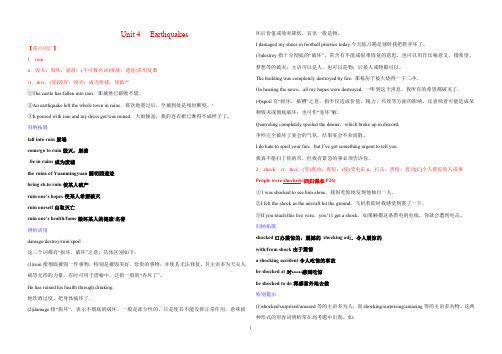
①I told him how Heathcliff had trapped US,and that Cathy was probably married to Linton by now.我 judging by/from 从……上看;根据……判断
告诉他希斯克利夫是如何骗我们入了圈套,还有凯茜很可能已嫁给了林顿。
lie in ruins 成为废墟 the ruins of Yuanmingyuan 圆明园遗迹 bring sb.to ruin 使某人破产 ruin one’s hopes 使某人希望破灭 ruin oneself 自取灭亡 ruin one’s health/fame 毁坏某人的健康/名誉 辨析活用 damage/destroy/ruin/spoil 这三个词都有“损坏,破坏”之意,具体区别如下: (1)ruin 指彻底摧毁一件事物,特别是摧毁美好、珍贵的事物,并使其无法修复,其主语多为天灾人 祸等无形的力量。有时可用于借喻中,泛指一般的“弄坏了”。 He has ruined his health through drinking. 他饮酒过度,把身体搞坏了。 (2)damage 指“损坏”,表示不彻底的破坏,一般是部分性的,只是使其不能发挥正常作用,意味损
(2)celebrate 表示”庆祝,庆贺”,常指庆祝或纪念有意义的日子或时刻,可直接跟表示节日、胜利、
成功等的名词或代词作宾语。如:
①we celebrated the New Year with a big party.我们举行了一场盛大的晚会来庆祝新年。
②He held a dance party to celebrate his daughter’S birthday.他举行了一个舞会以庆祝他女儿的生日。
unit4 Earthquake(知识点)
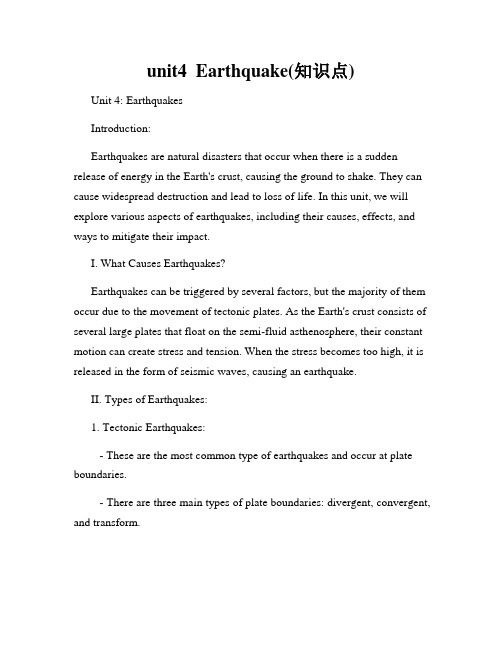
unit4 Earthquake(知识点)Unit 4: EarthquakesIntroduction:Earthquakes are natural disasters that occur when there is a sudden release of energy in the Earth's crust, causing the ground to shake. They can cause widespread destruction and lead to loss of life. In this unit, we will explore various aspects of earthquakes, including their causes, effects, and ways to mitigate their impact.I. What Causes Earthquakes?Earthquakes can be triggered by several factors, but the majority of them occur due to the movement of tectonic plates. As the Earth's crust consists of several large plates that float on the semi-fluid asthenosphere, their constant motion can create stress and tension. When the stress becomes too high, it is released in the form of seismic waves, causing an earthquake.II. Types of Earthquakes:1. Tectonic Earthquakes:- These are the most common type of earthquakes and occur at plate boundaries.- There are three main types of plate boundaries: divergent, convergent, and transform.- Divergent boundaries occur where plates move apart, while convergent boundaries occur where plates collide. Transform boundaries occur where plates slide past each other horizontally.- The intensity and magnitude of tectonic earthquakes vary depending on factors such as the type of boundary and the amount of accumulated stress.2. Volcanic Earthquakes:- Volcanic activity can also lead to earthquakes.- When magma rises to the surface, it can cause the surrounding rocks to crack, resulting in volcanic earthquakes.- These earthquakes are usually localized around the volcano and are associated with volcanic eruptions.3. Induced Earthquakes:- Human activities can sometimes trigger earthquakes.- Activities such as mining, reservoir-induced seismicity (due to filling of large reservoirs), and hydraulic fracturing (fracking) can induce seismic events.- Induced earthquakes may occur in areas where the Earth's crust is already under stress.III. Earthquake Effects:1. Surface Effects:- Shaking of the ground during an earthquake can cause various surface effects.- Buildings and infrastructure may collapse or suffer severe damage, leading to injuries and loss of life.- Landslides, ground cracks, and changes in the landscape can also occur.2. Secondary Effects:- Earthquakes can trigger secondary effects such as tsunamis, which are large ocean waves generated by the displacement of water.- Fires may break out due to damaged electrical systems or ruptured gas pipelines.- The movement of the ground can also lead to liquefaction, where saturated soil temporarily loses its strength and behaves like a liquid.IV. Mitigating Earthquake Impact:1. Preparedness:- Education and public awareness are crucial for earthquake preparedness.- Communities should have disaster response plans, evacuation routes, and emergency supplies in place.- Conducting regular drills and training sessions can help people understand the appropriate actions to take during an earthquake.2. Building Design:- Constructing buildings and infrastructure that can withstand seismic forces is essential.- Engineers use various techniques, such as base isolation and dampers, to reduce the impact of earthquakes on structures.- Building codes and regulations should be followed to ensure safety standards are met.3. Early Warning Systems:- Advances in technology have made it possible to develop early warning systems for earthquakes.- These systems can detect initial seismic waves and provide a few seconds to minutes of warning before the more destructive waves arrive.- Early warning can help prompt evacuations and give people time to take cover.Conclusion:Earthquakes are powerful natural phenomena that can have devastating consequences. By understanding their causes, effects, and implementing effective mitigation strategies, we can work towards minimizing the impact of earthquakes and protecting lives and infrastructure. Increased public awareness and preparedness are vital in ensuring resilience against these unpredictable yet recurring events.。
Unit 4 Earthquakes知识点讲解
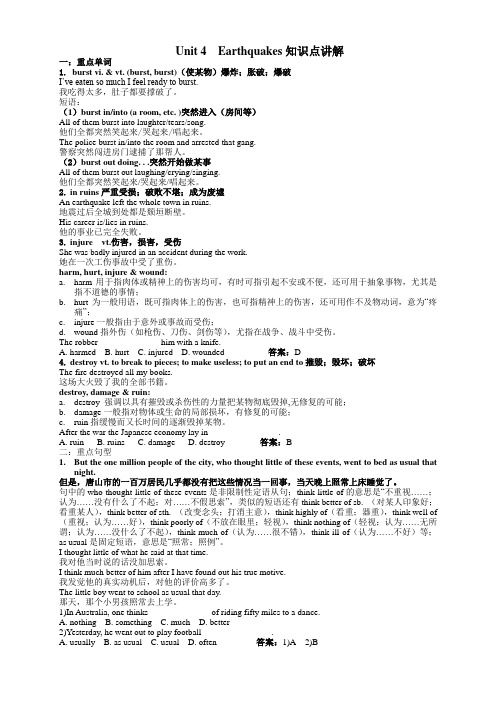
Unit 4Earthquakes知识点讲解一:重点单词1. burst vi. & vt. (burst, burst)(使某物)爆炸;胀破;爆破I’ve eaten so much I feel ready to burst.我吃得太多,肚子都要撑破了。
短语:(1)burst in/into (a room, etc. )突然进入(房间等)All of them burst into laughter/tears/song.他们全都突然笑起来/哭起来/唱起来。
The police burst in/into the room and arrested that gang.警察突然闯进房门逮捕了那帮人。
(2)burst out doing. . .突然开始做某事All of them burst out laughing/crying/singing.他们全都突然笑起来/哭起来/唱起来。
2. in ruins严重受损;破败不堪;成为废墟An earthquake left the whole town in ruins.地震过后全城到处都是颓垣断壁。
His career is/lies in ruins.他的事业已完全失败。
3. injure vt.伤害,损害,受伤She was badly injured in an accident during the work.她在一次工伤事故中受了重伤。
harm, hurt, injure & wound:a.harm用于指肉体或精神上的伤害均可,有时可指引起不安或不便,还可用于抽象事物,尤其是指不道德的事情;b.hurt为一般用语,既可指肉体上的伤害,也可指精神上的伤害,还可用作不及物动词,意为“疼痛”;c.injure一般指由于意外或事故而受伤;d.wound指外伤(如枪伤、刀伤、剑伤等),尤指在战争、战斗中受伤。
The robber______________ him with a knife.A. harmedB. hurtC. injuredD. wounded 答案:D4. destroy vt. to break to pieces; to make useless; to put an end to摧毁;毁坏;破坏The fire destroyed all my books.这场大火毁了我的全部书籍。
高一英语必修一Unit4Earthquakes知识点讲解和练习

1、关系代词which用来指物,在从句中可作主语或宾语。
This is a book which tells about space rocket technology.(作主语)
The letter which I received yesterday was from my brother.(作宾语)
【归纳总结】
give out分发;发出;用完give sth.away赠送;颁发;泄露
give back归还;复原givein呈上;倒戈,屈服,认输
give off发出,放出give over停止,中止
give up放弃give on to/onto sth.朝向,面对;通向
8、Your speech was heard by a group of fivejueges,all of whom agreed that it was thebest one this year.
易混词
辨析
例句
injury
多指意外事故受伤。比hurt正式,hurt多指伤痛,而injure则指损害健康、成就、容貌等,强调功能的损失。
A bullet injured his lefgt eye.
hurt
既可指肉体上的损害,也可指精神上、感情上的损害;作不及物动词,意为“(身体某部位)难受”。指肉体上的损害时,hurt可与badly,slightly,seriously等连用,但若指精神上的创伤,只能说very much/rather/deeply hurt。
(1)n.裁判员;法官;审判员
His father used to be a judge.他的父亲过去是一名法官。
(2)v.推断;断定
高中英语-Unit 4 Earthquakes修改版

→__s_u__r_v_i_v__a_l__ n.幸存;继续生存
21. useless adj.无用的;无效的;无益的→__u__s_e_f_u__l__adj.有用的,有
益的;有帮助的
22. shock vt.& vi.(使)震惊;震动→_s_h__o_c__k_i_n__g_ adj.令人震惊的 →_s_h_o__c_k__e_d__ adj.震惊的 23. dirt n.污垢;泥土→_d__i_r_t_y___ adj.脏的;弄脏的 24. electricity n.电;电流;电学→_e__le__c_t_r__ic_ adj.电的;用电的 →_e_l_e_c__t_r_i_c_a__l adj.发电的;有关电的
• 1. In the accident, many people got _______, some of whom suffered from some _________. Fortunately, the _________ were immediately rushed to the nearest hospital.(injure)
25. mine n.矿;矿山→__m__i_n__e_r__ n.矿工 26. frightevnt.使惊吓;吓唬→_f_r__i_g_h__t_e_n__eaddj.受惊吓的adj.令人
27. congratulation n.祝贺;(复数)贺词→c__o_n__g__r_a__t_u__late
第一部分 必修1 Unit 4 Earthquakes
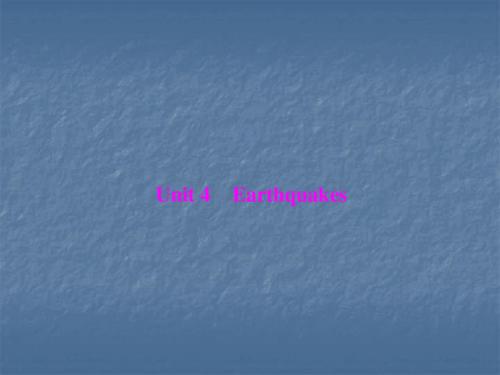
6.__s_u_f_fe_r_i_n_g__ n.苦难;痛苦→___s_u_ff_e_r_ vt.& vi.遭受;忍受; 经历→___su_f_f_e_re_r__ n.患者;受难者
7.___e_x_tr_e_m__e__ adj.极度的→___e_x_tr_e_m_e_l_y_ adv.极其;非常 8.__in_j_u_re__ vt.损害;伤害→__i_n_j_u_re_d_ adj.受伤的→___in_j_u_r_y_ n.伤害,损害;受伤 9.__s_u_r_v_iv_o_r__ n.幸存者;生还者;残存物→__s_u_r_v_iv_e_ vt.& vi. 幸存;存活下来→___su_r_v_i_v_al_ n.生存;存活;幸存 10.__d_e_s_t_ro_y__ vt.破坏;毁坏;消灭→___d_e_s_t_ro_y_e_rn.破坏者; 毁灭者→___d_es_t_ru_c_t_io_n__ n.破坏;毁灭
单句语法填空 1.(2017 年新课标Ⅱ卷·语法填空)Steam engines ___w_e_r_e_u_s_e_d (use) to pull the carriages. 2.Thousands of soldiers were sent there to rescue those __tr_a_p_p_e_d__ (trap) in the building. 3.(2018 年北京卷·阅读理解 A)One of my ankles was __in_j_u_r_ed
13.____re_s_c_u_e__ n.& vt.援救;营救→____re_s_c_u_e_r_ n.救援者 14.___t_r_ap___ vt.使陷入困境 n.陷阱;困境 15.__e_le_c_t_ri_c_it_y__ n.电;电流;电学→____e_l_e_c_tr_ic___ adj.电的; 带电的→____e_l_e_c_tr_ic_a_l__ adj.用电的;与电有关的 16.____d_is_a_s_te_r____ n.灾难;灾祸 17.___b_u_ry___ vt.埋葬;掩埋;隐藏
英语课件 Unit 4 Earthquakes

personal washing things
torch
food and sweets
money
You will take
blanket
mobile phone
medicine a bottle of water
Fast
reading
1.The text is written according to(根据) ______.
doctors were trapped under the ruins.
拓展 (1)rescue vt.& n.援救;营救 rescue sb./sth. from...把某人/某物从……营救出 来 come/go to one’s rescue来/去营救某人 a rescue team救援队
(2)trap vt.使陷入困境;诱骗,诱使;n.陷阱; 困境 be trapped in困在……中,陷在……中 trap sb. into (doing) sth.诱骗某人(做)某事
3.How many signs are given that suggest an earthquake would happen in the first paragraph? A.Five. B.Nine. C.Twelve. D.Seven.
4.What’s the meaning of the last sentence “Slowly,the city began to breathe again.”? A.People weren’t sad any more. B.The life in Tangshan began to return to normal. C.The earthquake finally came to an end. D.Those who were trapped were saved.
unit4 Earthquakes(全单元课件)

beautiful
peaceful
calm
green
What happened?
Tall buildings were destroyed.
The car was smashed(撞 毁) .
Roads were cracked.
Pre-reading
1. Imagine your home begins to shake
raise [reiz]( raised, raising) vt. 抬高;举起;提高,增加;饲养,种植 raise a question He raised a lot of chickens.
Railway tracks are now useless
pieces of steel.
ቤተ መጻሕፍቲ ባይዱ
More damage caused by the quake
• • • •
die chickens/pigs filled with sand Wells Rescue workers/doctors trapped Water ,food, hard to get electricity It seemed as if the world was at an end!!!
2. What do you think may happen before an earthquake?
Bright lights
can be seen in the sky..
The well wall has
deep cracks.
The farm animals will be too nervous to eat.
Look at the following pictures and what words would you like to describe them
人教版高中英语必修一课件:Unit 4 Earthquakes(共46张PPT)
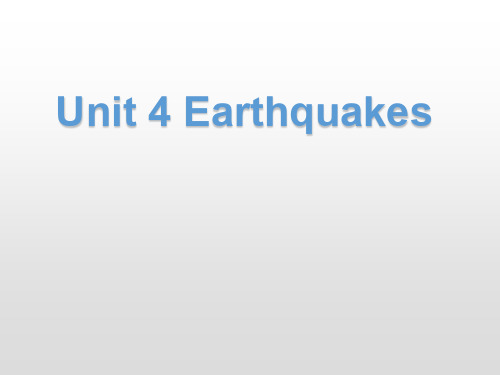
The world seemed at an end. Everything was destroyed.
__T_h__o_u_s_a_n__d_s_o__f__ families were killed and many children were left without parents.
Signs before the earthquake:
The water _____ in some buildings _p_ip_e_s__ and cracked _____b_u.rst
break
Part 2 Ruins
The damages caused during the earthquake.
After the earthquake
_s_e_n__t soldiers to Tangshan to
The
army:
rescue workers;
o_r_g_a_n_i_ze_d_ teams
to
_d_i_g__o_u_t
those who were trapped and to
bury the dead.
Part 3 (Para 4)
After the earthquake
rescue
Before the earthquake
sign
During the earthquake
damage
Structure of the whole passage :
order of the passage
time order
Disaster: A big earthquake
英语必修一Unit 4 Earthquakes词汇句子解析
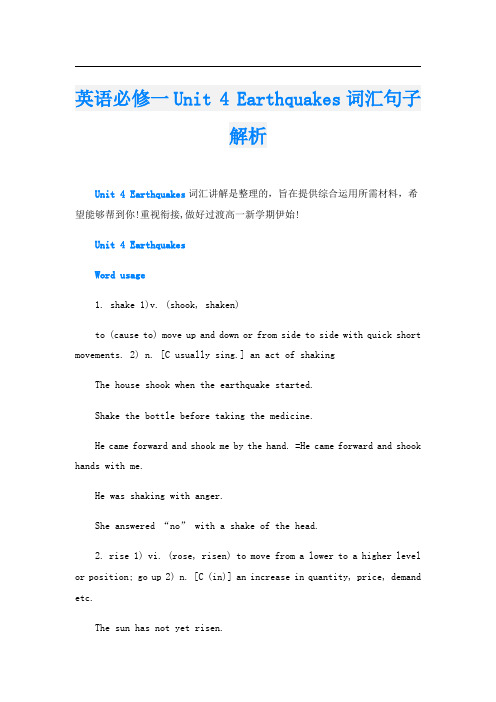
英语必修一Unit 4 Earthquakes词汇句子解析Unit 4 Earthquakes词汇讲解是整理的,旨在提供综合运用所需材料,希望能够帮到你!重视衔接,做好过渡高一新学期伊始!Unit 4 EarthquakesWord usage1. shake 1)v. (shook, shaken)to (cause to) move up and down or from side to side with quick short movements. 2) n. [C usually sing.] an act of shakingThe house shook when the earthquake started.Shake the bottle before taking the medicine.He came forward and shook me by the hand. =He came forward and shook hands with me.He was shaking with anger.She answered “no” with a shake of the head.2. rise 1) vi. (rose, risen) to move from a lower to a higher level or position; go up 2) n. [C (in)] an increase in quantity, price, demand etc.The sun has not yet risen.The population of the city has risen to five million.He rose and left the room.There will be a rise in unemployment next year.Theres been a sharp rise in the cost of living.2. pond n. an area of still water smaller than a lake, especially one that has been artificially madeSome cattle were drinking at the pond.There are some fish living in the pond.When an earthquake is coming, fish will jump out of ponds.3. burst 1) v. to (cause to ) break open or break apart suddenly and violently, usually as a result of pressure from within and often cause the contents to become widely scattered.2) n. an act of result of bursting; (of) a sudden short period of great activity, loud noise, strong feeling; outbreakThe balloon burst.After ten days of rain the river burst its banks.A burst of hand-clapping followed the ending of the song.4. canal n. an artificial stretch of water dug in the ground to allow ships or boats to travel alongit, or to bring water to or remove water from an areaCoal used to be sent here by canal.Canals have been built to irrigate the desert.The Panama Canal joins two oceans.5. steam n. [U] 1) water in the state gas produced by boiling2) power or effort produced by steam under pressure, and used for making things work or moveWho invented the steam engine?Steam was used to be the power of a train.There is steam bursting from that hole.6. ruin 1. n. a) [U] the cause or state of destruction and decayb) [C] a building that has been badly damaged or destroyed2. vt. a) to spoil or completely destroy a person or thingb) to cause someone to loss all their moneyThe temple has fallen into ruin.We visited the ruins of the temple.The heavy rain ruined our holiday.The hurricane ruined all the houses here.The flood ruined the crops.If I lose my lawsuit(官司), the cost will ruin me.7. injure vt. to cause physical harm to (a person or animal), especially in an accident; hurt seriously; to damageI hope I didnt injure her feelings.His back was injured.Two people were killed and seven were injured.His reputation will be badly injured by the vicious rumour.8. destroy vt. to damage sth so severely that it can not be repaired; put an end to the existence of; ruinA fire destroyed the house.What he said destroyed our last hope.All hopes of peaceful settlement were destroyed by his speech.9. brick n. [C,U] 1) a hard piece of baked clay used for building2) sth. in the shape of a brickThey used yellow bricks to build the house.The tower is made of bricks.Bricks covered the ground like red autumn leaves.10. useless adj. not of any useThis knife is so blunt. Its useless.I realized it was useless to reason with him.I was useless at maths. = My maths is very poor.11. shock 1) n. a) [C, U] a violent force from sth such as explosion,a crash or a hard blowb) [C, U] the feeling you get after sth unexpected and usually very unpleasant has suddenly happened, or you have received an unexpected piece of newsc) the poor medical condition of someone who has an accident and whose heart and lungs are not working properly2) v. to make someone feel very upset, angry, or unpleasantEarthquake shocks are often felt in Japan.The news of his death was a shock to us.The traffic accident sent him into a state of shock.They were shocked by her rudeness.We were shocked by his sudden death.12. rescue v. to save someone or sth from harm or dangerHe rescued three children from the burning building.The life boat was sent out to rescue the sailors from the sinking ship.The boy was rescued after hours at sea.13. disaster n. [C,U] a sudden event causes great loss or harmWe were all shocked by the disaster.The earthquake is one of the worst natural disasters the country has ever suffered. People began to wonder how long the disaster would last.14. organize v. to plan and arrange an event; to arrange things ina sensible orderWell organize an oral English contest.The story is very well organized.They organized the truckers into a union.15. shelter 1) n. a) [U] protection, especially from bad weather or danger b) a building that protects you from weather or danger.2) vt. to protect someone or sth from bad weather or danger;vi. to stay in a place in order to be protected from bad weather or dangerThe umbrella is a poor shelter from heavy rain.Their immediate need is for food, clothing and shelter.The wall sheltered us from the wind.She was accused of sheltering a murderer.She wad sheltered by the USA.In the rain people were sheltering in the doorways of shops.16. fresh adj. 1) new and different (only before a noun ); 2) recently picked, caught, produced and therefore in good condition (used of food);3) clean, cool and pleasantThey buy fresh meat.This kind of fish lives in fresh water.She is fresh from university.She is quite fresh to office work.17. percent n. parts for each 100The bank has increased its interest rate by one percent.Over ninety percent of the islanders here are illiterate.He spends a large percent of his income on food and drink.18. speech n. 1) [C] a formal talk to a group of listeners2) [U] the ability to speak or the act of speaking3) [U] way of speakingThe chairman made an opening speech.She is researching speech development in children.We express our thoughts by speech.By your speech I can tell youre from Hong Kong.19. judge 1) vi. vt. to decide who or what is the winner in a competition2) [vt. + that] to form or give an opinion about someone or sth after careful thoughtjudging from, judging by…3) n. a public official who has the power to decide questions brought before a court of law; a person who has the knowledge and experience to give an opinion about the value of sthYou cant judge a book by its cover.He is going to judge the first race.We must judge whether he is guilty.The prisoner was taken before the judge.He was one of the judges at the horse race.20. honour 1) n. a) [U] great respect and admirationb) [sing] sth that brings great respect and pride2) v. to show respect to sb. or to praise sb. publiclyWe fight for the honor of our country.He is an honor to our school.Children should be taught to show honor to their elders.He honors his teachers.20. prepare 1) vt. to make sth. ready for a future event or action 2) vi. to get ready to do sth.They prepared themselves for the worst.When we arrived home, mother had already prepared dinner for us.I was preparing for bed when I heard a knock at the door.Useful expressions1. right awayat once ; in no time; immediatelyI will return the book right away.I am getting in touch with him right away.We are about to start right away.2. end1) at an endfinish; overIt seems that the world was at en end.2) bring… to an end =put an end to…I wonder how I can bring the dispute to an end.=I wonder how I can put an end to the dispute.3) come to an endThe meeting came to an end at midnight.4) at the end of…At the end of the road there is a shop.5) by the end of…How many English words have you learned by the end of last term?6) in the end =at last; finallyHe will be a scientist in the end.3. dig out1) to get sth out of a place, using a spade or your hands2) to find sth you have not seen for a long time, or that is not easy to findLets dig out the roots.Why did you dig out all those old magazines?We must dig the truth out of him.1. a (good \ great \ large) number of+ n.(pl.)many; a large quantity of; a lot ofA good number of students are not interested in modern art.Ive seen the film a number of times.The Great Wall attracts a great number of foreign tourists every day.the number of…The number of private colleges has increased.= Private colleges have increased in number.5.give out1) to give sth to a number of different people, especially to give information to people2) to produce light, heat, a sound, a gas, smell etcYou have no right to give my telephone number out.Students were giving out leaflets(传单)to everyone on the street.The teacher gave out the examination papers.The radiator (散热器) is giving out a lot of heat.与give有关的常用短语还有:give away 送掉,捐赠give in 让步,屈服give off 发出(气味、光、热、声音等),此时相当于give outgive up放弃give back 归还6.thousands of基数词+s,并不表示确切的具体数字,可以单独使用,也可以先接介词of 再接复数名词。
【人教版】高中英语必修一Unit-4单元知识点

必修一Unit4 Earthquakes1、In the city, the water pipes in some buildings crashed and burst. 城市里,一些大楼里的水管爆裂。
burst爆裂,突发The square is bursting with tourists。
广场上到处都是游客。
I felt as if my heart would burst with joy。
我觉得自己高兴得心花怒放。
The police burst through the door。
警察破门而入。
There was a burst of laughter in the next room. 隔壁房间里突然爆发出一阵笑声。
联想扩展:(1) burst in on…突然打断He burst in on our conversation. 他突然打断了我们的谈话。
(2)burst into +n。
突然…The speaker burst into angry speech. 演讲者突然讲粗话.(3) burst out + doing突然…The woman burst out crying like a child. 那个妇女突然像小孩一样哭了。
(4)burst to do sth. 迫切想做某事I am bursting to tell you the news. 我迫不及待的想告诉你这个消息。
2、But the one million people of the city,who thought little of these events, were asleep as usual that night。
但是认为这没什么的一百万城里人,那天晚上还像往常一样睡觉。
affair,event,accident,incident,matter, businessaffair 指要做的事或已经发生的事。
高考英语一轮复习话题4自然灾害(Unit4Earthquakes)新人教版必修1

话题4 自然灾害〔Unit 4 Earthquakes〕晨读背诵根底知识自测一、单词拓展(A)根据音标及词义写出英文单词。
1. event [ɪˈvent]n. 事件;大事2. dirt [dɜːt]n. 污垢;泥土→dirty [dɜːt ɪ]adj. 脏3. burst [bɜːst]vi. 爆裂;爆发;n. 突然破裂;爆发4. ruin [ˈruːɪn]n. 废墟;消灭;vt.〔使〕破产;消灭5. injure [ˈɪndʒə(r)]vt.& vi. 损害;伤害→injured [ˈɪndʒəd]adj. 受伤→injury [ˈɪndʒərɪ]n. 伤口6. useless [ˈjuːslɪs] adj. 无用;无效;无益7. destroy [dɪˈstrɔɪ]vt.破坏;毁坏→destruction [dɪˈstrʌkʃn]n. 破坏8. electricity [ɪˏlekˈtrɪsətɪ]n. 电;电流;电学→electric [ɪˈlektrɪk]adj. 用电;带电→electrical [ɪˈlektrɪkl]adj.与电有关9. rescue [ˈreskjuː]vt.& n. 援救;营救10. disaster [dɪˈzɑːstə(r)]n.灾难;灾祸11. shock [ʃɑk]vt.& vi. 〔使〕震惊;振动n. 休克;打击;震惊12. bury [ˈberɪ]vt. 埋葬;掩埋;隐藏13. mine [maɪn]n. 矿;矿山;矿井→miner [ˈmaɪnə(r)] n. 矿工14. frighten [ˈfraɪt(ə)n] vt. 使惊吓;吓唬→frightened [ˈfraɪt(ə)nd] adj. 受惊;受恫吓→frightening [ˈfraɪtnɪŋ] adj. 令人恐惧15. judge [dʒʌdʒ] n. 裁判员;法官vt. 判定;判断;判决16. sincerely [sɪnˈsɪəlɪ]adv. 真诚地;真挚地→sincere [sɪnˈsɪə]adj. 真诚;真挚(B)单词活用用所给词正确形式填空。
高中英语Unit4EarthquakesSectionⅠWarmingUpReading_Compr

Ⅰ Fast-reading Skim the text and choose the best answer. 1.What’s the main idea of the text? A.A terrible earthquake of Tangshan. B.Before the earthquake of Tangshan. C.During the earthquake of Tangshan. D.Damages of the earthquake of Tangshan. 答案:A
Unit 4 Earthquakes
The Chinese government was illprepared for a disaster of this scale at that time. The day following the quake, helicopters and planes began dropping food and medicine into the city. About 100,000 soldiers of the Chinese People’s Liberation Army were ordered to Tangshan, and many had to march on foot from Jinzhou, a distance of more than 180 miles. About 30,000 medical personnel were called in, along with 30,000 construction workers. In the decisive first week after the disaster, many people died from lack of medical care.
人教版 高中英语 必修一 Unit 4 Earthquakes 单词课件 44PPT
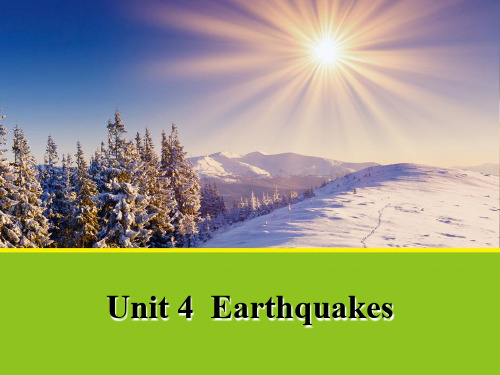
Unit 4 Earthquakes
Words and Expressions
1. earthquake n. 地震;大动荡 /ˈɜːθkweɪk/ 复数 earthquakes
2. quake /kweɪk/
n. 震动;震荡 vi.震动,颤抖,哆嗦
3. right away 立刻;马上
3) frighten sb/sth off 吓走,吓跑 4) frighten sb away 吓走
frightening frightened
adj. 令人恐惧的 adj. 受恐吓的,受惊吓的
1) be frightened of (doing) sth. 害怕(做)某事
2) be frightened at/by sth. 因某事而害怕
2) There were millions of people there. 那里人山人海。
3) Two million pounds was withdrawn from the account.
两百万英镑从该账户中被提取。
11. event n. 事件; 大事; 比赛项目 /ɪˈvent/
incident:意为"事件,事变",用于表示突发事件或
22. survivor n. 幸存者;生还者
/səˈvaɪvə/ survive v.幸存
He was the only survivor of the earthquake. 他是地震唯一的幸存者
23. destroy vt. 破坏;毁坏;消灭 /dɪˈstrɔɪ/
destruction n.破坏;毁坏;消灭
The earthquake almost completely destroyed the city. 地震几乎彻底毁了这座城市。
Unit4Earthquakes(通用3篇)
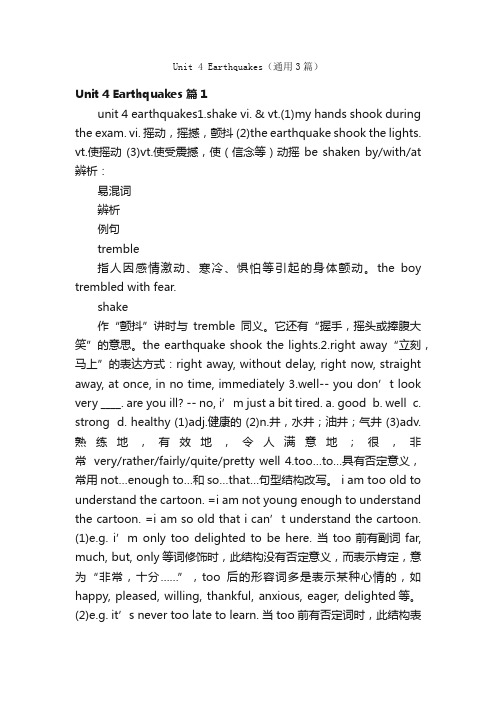
Unit 4 Earthquakes(通用3篇)Unit 4 Earthquakes 篇1unit 4 earthquakes1.shake vi. & vt.(1)my hands shook during the exam. vi. 摇动,摇撼,颤抖 (2)the earthquake shook the lights. vt.使摇动 (3)vt.使受震撼,使(信念等)动摇 be shaken by/with/at 辨析:易混词辨析例句tremble指人因感情激动、寒冷、惧怕等引起的身体颤动。
the boy trembled with fear.shake作“颤抖”讲时与tremble同义。
它还有“握手,摇头或捧腹大笑”的意思。
the earthquake shook the lights.2.right away“立刻,马上”的表达方式:right away, without delay, right now, straight away, at once, in no time, immediately 3.well-- you don’t look very ____. are you ill? -- no, i’m just a bit tired. a. good b. well c. strong d. healthy (1)adj.健康的 (2)n.井,水井;油井;气井 (3)adv.熟练地,有效地,令人满意地;很,非常very/rather/fairly/quite/pretty well 4.too…to…具有否定意义,常用not…enough to…和so…that…句型结构改写。
i am too old to understand the cartoon. =i am not young enough to understand the cartoon. =i am so old that i can’t understand the cartoon.(1)e.g. i’m only too delighted to be here. 当too前有副词far, much, but, only等词修饰时,此结构没有否定意义,而表示肯定,意为“非常,十分……”,too后的形容词多是表示某种心情的,如happy, pleased, willing, thankful, anxious, eager, delighted等。
必修一Unit4 Earthquakes

Unit 4
Earthquakes——地震
4.部分否定 All hope was not lost ______________________(不是所有的 希望都破灭了).
栏目 导引
Unit 4
Earthquakes——地震
5.定语从句及“the+adj.”表示集合 概念 The army organized teams to dig out who were trapped those __________________(被困的) the dead and to bury ___________ (死者).
express 10.Mr. Wang couldn’t ____________
himself clearly when he heard the news, expression but I could tell from his ____________ that he was very upset.(express)
栏目 导引
Unit 4
Earthquakes——地震
解析:选B。考查定语从句。句意为:
我爷爷特别喜欢谈论美好的往昔,在
老年人当中,这样的情况很普遍。这
里用as引导非限制性定语从句,指代主
句内容,并在从句中作主语。
栏目 导引
Unit 4
Earthquakes——地震
考点串讲讲练互动
单词精研 1burst vt.& vi. (使)爆裂;(使)裂开;( n. 突然破裂;爆发
栏目 导引
Unit 4
Earthquakes——地震
2injure
vt. 损害;伤害
(教材P26)Twothirds of them died or were injured during the earthquake. 他们中有2/3在地震中伤亡。
终稿-高考英语Book 1 Unit 4 Earthquakes

Book 1Unit 4Earthquakes词汇积累分层单词▶写作词汇1.n.废墟;毁灭 vt. 毁灭;使破产2. vt.破坏;毁坏;消灭3.vt. & vi.(使)震惊 n. 休克;打击;震惊4. n. & vt.援救;营救5. vt.使陷入困境 n.陷阱;困境6. vt.埋葬;掩埋;隐藏7. n. & vt.损失;损害8.n.裁判员;法官 vt. 断定;判断;判决9.vt.损害;伤害10.adv.真诚地;真挚地答案 1.ruin 2.destroy 3.shock 4.rescue5.trap 6.bury7.damage8.judge 9.injure10.sincerely▶阅读词汇1.earthquake n.2.burst vi. & n.3.event n.4.disaster n.5.shelter n.6.title n.7.outline n.8.headline n.9.cyclist n.10.reporter n.11.well n.12.pipe n.lion n.14.canal n.15.steam n.16.brick n.17.dam n.18.track n.19.mine n.20.bar n.答案 1.地震 2.爆裂,爆发;突然破裂 3.事件;大事 4.灾难;灾祸 5.掩蔽;掩蔽处;避身处6.标题;头衔7.要点;大纲;轮廓8.报刊的大字标题9.骑自行车的人10.记者11.井12.管;导管13.百万14.运河;水道15.蒸汽;水汽16.砖;砖块17.水坝;堰堤18.轨道;足迹;痕迹19.矿;矿山;矿井20.条;棒;条状物▶拓展词汇1. n.民族;国家;国民→ adj.民族的;国家的;国民的2. n.污垢;泥土→ adj.脏的3. n.苦难;痛苦→ v.遭受,忍受4. adj.极度的→ adv.极其,非常5. vt.损害;伤害→ n.伤害;损害→ adj.受伤的6. adj.无用的;无效的;无益的→ n.使用;用处→ adj.有用的;有益的7. n.电;电流;电学→ adj.用电的;带电的→ adj.与电有关的;电的8. vt.使惊吓;吓唬→ adj.受惊的;受恐吓的→ adj.令人恐惧的9. n.祝贺;(复数)贺词→ vt.祝贺10. adv.真诚地;真挚地→ adj.真诚的;真挚的11. vt.表示;表达 n.快车;速递→ n.表达;表情答案 1.nation;national 2.dirt;dirty3.suffering;suffer 4.extreme;extremely5.injure;injury;injuredeless;use;useful7.electricity;electric;electrical8.frighten;frightened;frightening9.congratulation;congratulate10.sincerely;sincere11.express;expression高频短语1.立刻;马上2.以为……没什么了不起3.结束;终结4.严重受损;破败不堪5.掘出;发现6.许多;大量的7.因……而自豪8.从……判断9.陷入……10.埋头于……答案 1.right away 2.think little/nothing of 3.at an end 4.in ruins 5.dig out 6.a (great) number of7.be proud of/take pride in8.judge from9.be trapped in10.be buried in经典句型1.(仿佛)the world was at an end!2.Thousands of families were killed and(许多孩子变成了孤儿).3.(他们无论朝哪里看)nearly everything was destroyed.4.(不是所有的希望都)lost.答案 1.It seemed as if 2.many children were left without parents 3.Everywhere they looked 4.All hope was notBook 1Unit 4Earthquakes课文与语法填空阅读下面短文,在空白处填入1个适当的单词或括号内单词的正确形式。
- 1、下载文档前请自行甄别文档内容的完整性,平台不提供额外的编辑、内容补充、找答案等附加服务。
- 2、"仅部分预览"的文档,不可在线预览部分如存在完整性等问题,可反馈申请退款(可完整预览的文档不适用该条件!)。
- 3、如文档侵犯您的权益,请联系客服反馈,我们会尽快为您处理(人工客服工作时间:9:00-18:30)。
必修1Unit 4Earthquakes要点梳理高效梳理·知识备考●重点单词1.burst vi.爆裂;爆发n.突然破裂,爆发2.event n.事件;大事3.nation n.民族;国家;国民→national adj.国家的,民族的→nationality n.国籍4.ruin n.废墟;毁灭vt.毁灭;使破产5.suffering n.苦难;痛苦→suffer v.受苦,遭受6.extreme adj.极度的→extremely adv.7.injure vt.损害;伤害→injured adj.受伤的→injury n.伤害,损害8.destroy vt.破坏;毁坏;消灭9.useless adj.无用的;无效的;无益的→useful(反义词)→use v. & n.使用,利用10.shock vt. & vi.(使)震惊;震动n.休克;打击;震惊11.rescue n. & vt.援救;营救12.trap vt.使陷入困境n.陷阱;困境13.electricity n.电;电流;电学→electric adj.用电的;带电的;发电的→electrical adj.与电有关的;电学的14.disaster n.灾难;灾祸15.bury vt.埋葬;掩埋;隐藏16.shelter n.掩蔽;掩蔽处;避身处17.damage n. & vt.损失;损害18.frighten vt.使惊吓;吓唬→frightened adj.受惊的;受恐吓的→frightening adj.令人恐惧的19.judge n.裁判员;法官vt.断定;判断;判决→judgement n.判断,判决20.express vt.表示;表达n.快车;速递→expression n.表达→expressive adj.有表现力的●重点短语1.right away立刻2.at an end 结束3.in ruins成为废墟4.dig out掘出;发现5.a(great) number of 许多;大量的6.give out分发;发出(气味、热等)7.thousands of成千上万8.think little of 不重视;不假思索9.blow away吹走;刮走10.be proud of以……而自豪11.instead of代替12.be trapped in陷入……之中13.be known for/as因为/作为……出名14.bring in引进;引来●重点句型1.In the farmyards, the chickens and even the pigs were too nervous to eat. 在农家院子里,鸡和猪都烦躁不安,以致不吃食。
2.It seemed as if the world was at an end! 世界似乎到了末日!3.All hope was not lost. 不是所有的希望都破灭了。
高考范文(2009·湖南卷)假设你是某中学新老师李红,请给你的朋友张华写一封信,告诉他你第一天上课的情况,主要内容如下:1.描述一件课堂上令你印象深刻的事情;2.介绍你处理该事的方式;3.谈谈你的感想。
注意:1. 词数不少于120个;2.可适当发挥想象,增加细节,以使行文连贯;3.文中不得出现与本人及学校相关的任何真实信息。
____________________________________________________________________________[思路点拨]本文需要考生发挥想象,适当增加内容,写作的自由空间比较大。
文章应包含以下要点:1.描述一件课堂上令你印象深刻的事情;2.介绍你处理该事的方式;3.谈谈你的感想;4.注意词数是不少于120。
[范文]Dear Zhanghua,Long time no see! I miss you very much. Now I am so excited that I can't wait to share with you an unforgettable experience. I gave my first lesson today, which left me a deep impression.Seeing a young teacher enter the classroom, my students began to make more noise. I stood on the platform, feeling embarrassed and not knowing what to do. Then I realized something must be done. I asked the kids whether they liked English songs. After taking a deep breath, I sang a song I had practised many times. To my surprise, all the kids were concentrating on my class later on.How delighted I am now! Actually, whatever happens, we must stay calm first and then find awise solution. Looking forward to your reply.Yours,Li Hong考点探究互动探究·能力备考Ⅰ.词汇短语过关1.burst vi. (burst, burst) 爆裂;爆发n. 突然破裂;爆发burst out 迸发;突然发作;突然……起来burst into 闯入;突然出现;突然……起来;突然发作burst into tears/songs/laughter/angry speech突然哭/唱/笑/吵起来burst out crying/singing/laughing突然哭起来/唱起来/笑起来burst in 闯入burst with anger/grief/joy 勃然大怒/心痛欲绝/乐不可支be bursting to do 渴望,急着要做(某事)at a(one) burst 一阵;一口气;一举;一下a burst of anger 怒火的迸发[即学即练1](1)She burst out ______ for a while, and burst into ______ for another moment, which made us at a loss.她一会儿突然哭起来,一会儿又突然笑起来,这使我们一头雾水。
(2)We all thought his heart would burst ______ ___________________.我们都认为他心中的快乐快要爆发出来了。
(3)The police ____________ and arrested the gang.警察突然闯进来逮捕了那帮人。
cryinglaughterwithhappinessburst in(4)Tom is bursting ____________ his mother.汤姆急着要见他的妈妈。
(5)There was __________________ laughter in the next room.隔壁房间里突然爆发出一阵笑声。
to seea burst of2.ruin n. [U]毁坏;毁灭,崩溃[C](pl.) 废墟,遗迹v. (使)破产,(使)堕落,毁灭in ruins 成为废墟;破败不堪be the ruin of 成为……毁灭(堕落)的原因come/fall to ruin 毁灭,灭亡;崩溃;破坏掉bring sb. to ruin 使某人失败;使倾家荡产bring ruin upon oneself 自取灭亡ruin oneself 自取灭亡ruin one's health/fame 毁坏某人的健康/名誉[即学即练2](1)Drink was his father's ______ and it will be the ______of him too.酗酒是他父亲失败的原因,他也将遭同样的厄运。
(2)Years of fighting have left the area ___________.多年的战事已经使得这个地区满目疮痍。
(3)A large number of churches __________________ after the revolution. 革命过后,许多教堂都毁了。
(4)The heavy rain __________________.大雨把我们的假期彻底搞糟了。
(5)If you go on like this, you'll ____________.如果你继续这样下去,你会自己毁了自己。
ruinruinin ruinsfell to ruinruined our holidayruin yourself3.injure vt. 损害,伤害injury n. 伤,伤口;伤害injured adj. 受伤的,受委屈的do an injury to sb.伤害某人the injured伤员an injured look/expression委屈的样子/表情injured pride/feelings受到伤害的自尊/情感[即学即练3](1)The boy ______ his leg.这个男孩把腿弄伤了。
(2)Your remark may ______ her pride.你的话也许会伤她的自尊。
(3)I didn't mean to ______ her ____________.我并未打算伤害她。
injuredinjuredoan injury4.shock n. [U;C]打击;震惊;震动;休克vt. 使震惊,使惊愕be shocked at/by (doing) sth. 被震惊be shocked to do sth. 惧怕做某事It shocked sb. to see/hear...看见/听到……使某人震惊。
(be) a shock to sb. 对某人来说是个打击[即学即练4](1)The news of his wife's death was ________________________ him.他妻子去世的消息对他打击太大了。
